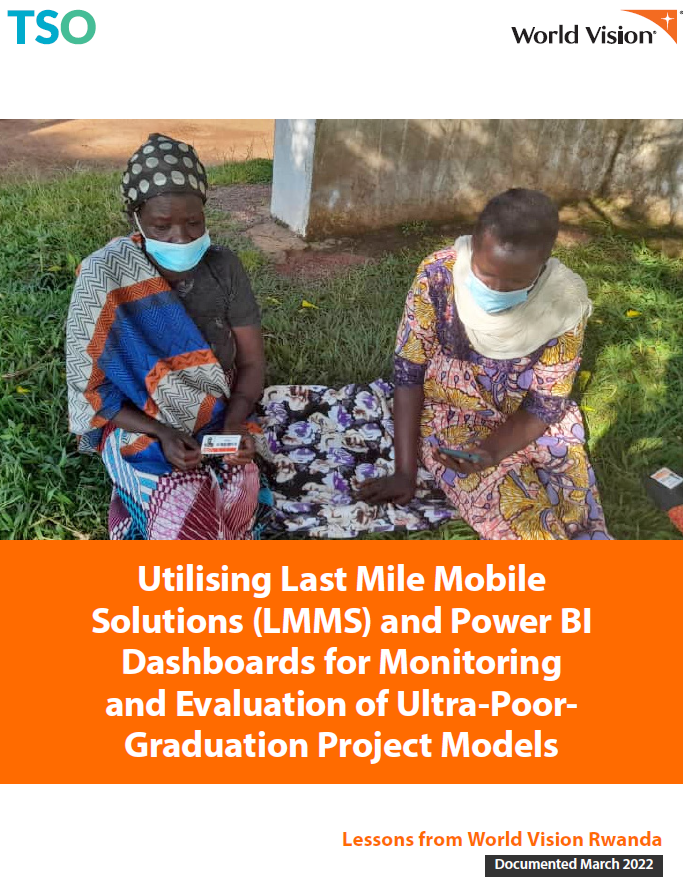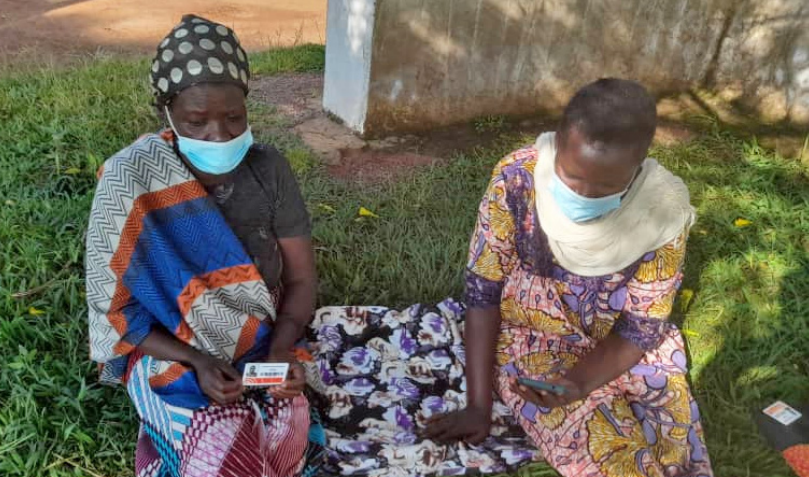
LMMS Flexible Forms Integration with KoBo Toolbox and Customized Dashboards for Monitoring and Managing Ultra Poor Graduation
The use of Last Mile Mobile Solutions (LMMS) by World Vision Rwanda in the Ultra Poor Graduation (UPG) projects has completed a report of this outcome and looks into the details of digitised monitoring and managing large and complex UPG projects. The report describes the practical lessons learnt, challenges and opportunities using Last Mile Mobile Solutions and integration of KoBo Toolbox as the platforms for project management of over 50,000 vulnerable households.
Excerpts shared here are focused on the use of LMMS Solutions and at a high level, complete report may be viewed in its entirety at link at the end of this article.
1 Digitisation of Ultra-Poor Programme (UPG) in Rwanda
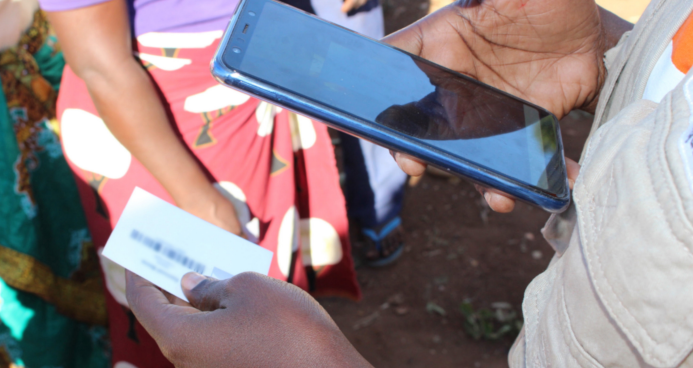
In a UPG programme, households in extreme poverty are identified using a multi-stage targeting process and a package of multi-sectoral interventions is provided to the households for 24 months.
Due to the vast scale of the programme, it was evident that a digital solution was necessary to manage the
monitoring and evaluation (M&E) data for the 50,000 UPG households.
To address these needs, WV Rwanda decided to utilise the Last Mile Mobile Solution (LMMS), World Vision’s in-house mobile information management platform system for humanitarian response.
Utilising LMMS Registration allowed the ease of collecting, storing and managing a vast amount of household data.
Ensured the data was accessible from different geographical locations, and the LMMS Flexible Forms integrated with KoBo Toolbox provided the ability to track households’ longitudinal data. Customized reports provided an easy to access and easy to view data overview of such a vast amounts of data in a safe and secure environment protecting UPG households’ personal data.
2 Integration of Last Mile Mobile Solution as a Monitoring tool
LMMS is World Vision’s in-house mobile information management platform system for humanitarian response, which provides numerous solutions, including digital identity, beneficiary registration, distribution-in-kind, cash-based programming, activity and attendance tracking, flexible forms with KoBo Integration, and management
insights and analytics. Within the World Vision Partnership, the LMMS services that are best known and widely used are the digital identity and cash-based programming solutions in emergency operations.
Household monitoring data can be collected using the LMMS Flexible Forms Solution, which uses KoBoToolbox (an open source data collection software).
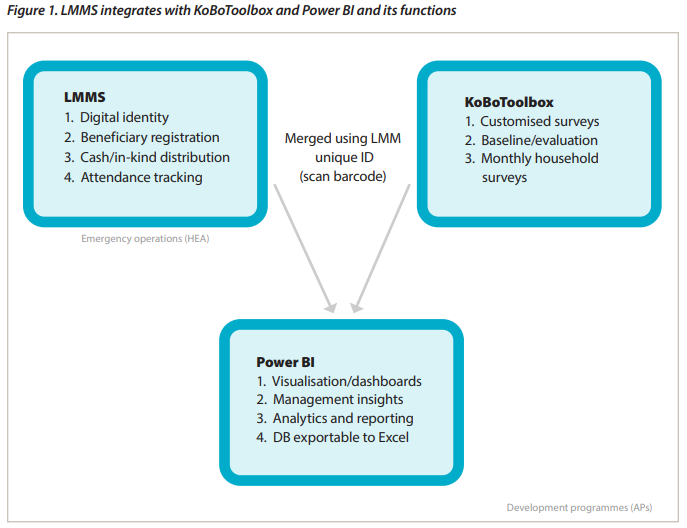
The monitoring data is then matched with the registered household on LMMS through the LMMS unique
identification number or through simply scanning the unique bar code on the LMMS ID card.
3 The learning initiative for the LMMS pilot in UPG M&E
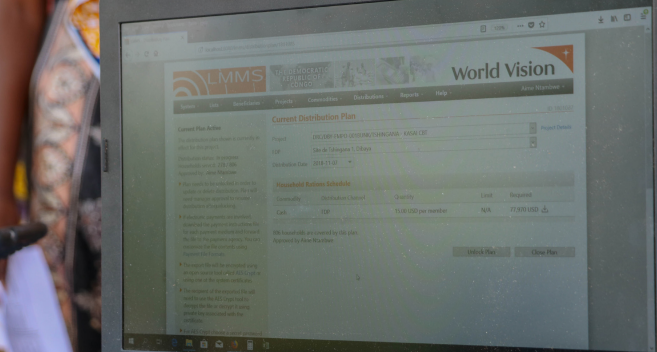
LMMS is World Vision’s in-house mobile information management platform system for humanitarian response, which provides numerous solutions, including digital identity, beneficiary registration, distribution-in-kind, cash-based programming, activity and attendance tracking, flexible forms, and management
insights and analytics. Within the World Vision Partnership, the LMMS services that are best known and widely used are the digital identity and cash-based programming solutions in emergency operations.
Household monitoring data can be collected using the LMMS Flexible Forms Solution, which uses KoBoToolbox (an open source data collection software).
The integration of KoBo Toolbox allows the creation of customized surveys which once completed are closed. The beneficiary data in LMMS allows the beneficiary demographic and other data to remain alive and be updated as needed.
The monitoring data is then matched with the registered household on LMMS through the LMMS unique identification number or through simply scanning the unique bar code on the LMMS ID card.
4 Adaptive management using dashboards
By the time the learning report was documented in March 2022, the dashboard had been in place for four months effectively (since November 2021Volunteers collect data each month as they undertake household monitoring together with partners – using a KoBoCollect mobile application which feeds into the LMMS platform – and that data is eventually visualised through the Power BI dashboard. Each of the 816 volunteers collects both project and demographic data from an average of about 61 households, scanning LMMS cards and synchronising the data each evening.

The dashboard feedback is currently extracted by the System Administrator and sent to the Technical Advisor and then to the project managers. The field managers then send the dashboard findings to field coaches as essential feedback that they use to ascertain and adjust training progress, informing volunteer focus and prioritisation of geographical areas for training and monitoring logistical planning.
5 Conclusion and recommendations
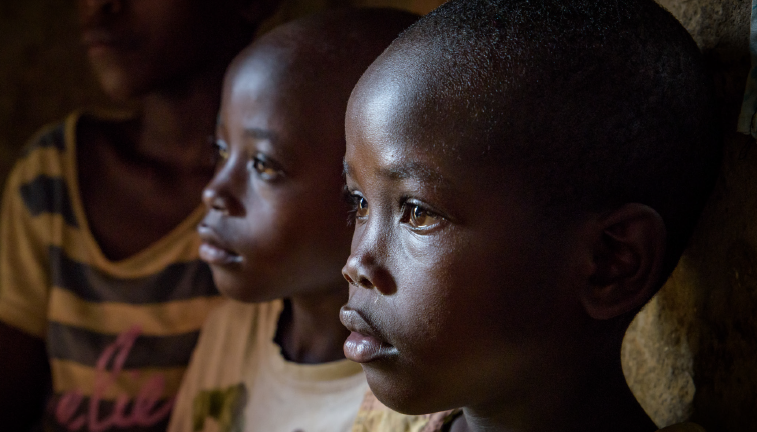
WV Rwanda initiated the utilisation of KoBoCollect, Last Mile Mobile Solutions and Power BI on an Ultra-Poor Graduation (UPG) project from 2021 as a field office-driven digitisation initiative for efficient programming. By the time the learning report was documented in March 2022, the dashboard had been in place for four months effectively, with 816 volunteers (with an average of about 61 households each) collecting both project and demographic data to enhance the UPG project monitoring system. This was a wonderful opportunity for learning across not only the field office and with partners, but also within the World Vision Partnership at large.
Author: Giselle Drouillard-Salom
